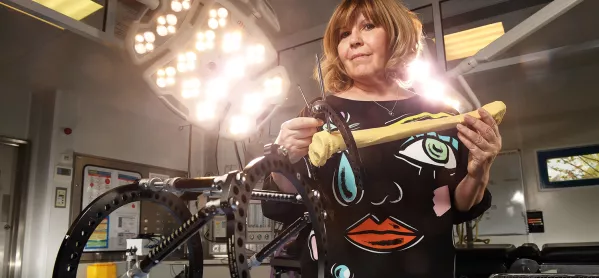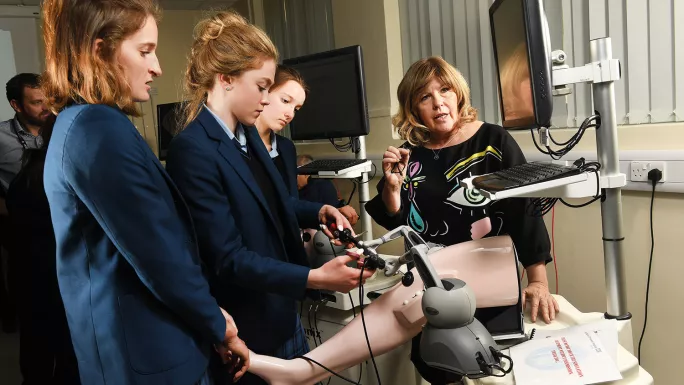- Home
- TES talks to... Maggie Philbin
TES talks to... Maggie Philbin

I’m frequently asked to give ‘inspiring talks’ to students,” says Maggie Philbin, one-time Tomorrow’s World presenter and current CEO of TeenTech. “But I would rather talk to parents [and give] students ongoing experiences with people from industry instead. Most parents want the best for their kids but many have outdated ideas on ‘safe’ careers. There’s no point helping students to see fresh possibilities if you don’t explain the opportunities in contemporary industry and the value of different pathways to parents.”
The pathways Philbin is most concerned about are maths and technology based, and the parents she is most keen to get in front of are those with daughters.
“There has always been a tendency to encourage boys to pursue engineering and technology subjects; even at home, parents can unknowingly inhibit girls’ educational growth in this area,” she explains.
Philbin is doing her best to change the status quo. In 2008, she co-founded TeenTech, which organises interactive science, technology, engineering and maths (Stem - an acronym she dislikes, but more on that later) initiatives for teenagers, helping them to appreciate the career opportunities available in those fields.
The idea for TeenTech was conceived while filming students at a comprehensive school in Berkshire. “It was obvious that while they were curious and interested in technology and science, they couldn’t see the opportunities,” she recalls. “I wanted to bring some of the excitement I’d felt on Tomorrow’s World to those young people. So many students have exactly the right aptitude for careers in tech, but these skills aren’t always recognised.”
Philbin is acutely aware of the gender gap in science and technology careers. Despite the issue having been a hot topic for many years, it seems that previous attempts to increase the number of girls studying Stem subjects in higher education have had little effect.
The university admissions service Ucas reported that, in 2016, just 13 per cent of students applying to study computer science were girls; 16 per cent in engineering; 23 per cent in physics; and 36 per cent in maths.
Compared with 2007, physics and engineering have enjoyed slight increases in female admissions, while computer science has remained the same and the maths intake has dropped.
Targeting parents
“We need to change people’s perceptions of the kind of roles that society still sees as being male,” says Philbin. “But altering perceptions isn’t easy and can’t be achieved with one-off experiences. It’s not like a measles jab.”
This is why she is keen to get in front of parents, to begin to change the narrative at home. But she also thinks that a lot more could be done in schools. For starters, the full breadth of post-school options should be better relayed to students, she believes.
“Teachers are very familiar with the university route because most would have followed that path, but they’re less familiar with apprenticeships and the strong opportunities in these areas, which don’t necessarily preclude a degree qualification,” argues Philbin.
Part of the problem is the system itself, she says: “I think we make it unnecessarily problematic for students who might be well suited for this form of learning and who currently have to make multiple applications, on completely different application forms with different deadlines. Whereas for university it’s just one form, which teachers find time to support.”
Philbin is also adamant that schools need to be much better at understanding and showcasing to girls the breadth of opportunities available from having studied Stem subjects, and how qualities they might already possess could be applied in different areas.
“For example, today’s music industry is driven by technology, while anyone wanting to work in PR or marketing will quickly discover data science is important,” she says.
“We also need to show that gaining skills in subject areas valued by the engineering or technology industry, for example, are valued by everybody. No one is going to turn away someone who has done brilliantly in maths and physics from an opportunity in, say, a retail organisation. Such subjects can act as a trampoline into any industry.”

TeenTech students try ‘virtual’ keyhole surgery at Stanmore Hospital
Allergy to acronyms
One thing that irks Philbin in particular is the use of Stem and Steam (which adds art and design) acronyms. The terminology wasn’t started by schools, but it has certainly found a home in the classroom.
While she appreciates that the terms are convenient, Philbin admits to having “a bit of an allergy to them”.
“I don’t believe it’s helpful for students or teachers to think that subjects can be put in neat groups,” she says. “I remember a student telling me that she wasn’t doing physics because she was interested in music and didn’t think they went together well.”
Somewhat controversially, perhaps, she sees careers education as an important part of a teacher’s role. Careers are continually evolving and it’s a big ask to expect any one person at school to be responsible for dishing out credible and constructive advice, she believes.
“All teachers have a responsibility to understand where their subject can be used within the various industries,” states Philbin. “Language teachers, for instance, could alert students to the possibility of applying their skills in cybersecurity.”
Career fairs held at school should be overhauled, she adds: “Schools must think carefully when someone comes in to talk about different industries or careers. Sometimes speakers are inspiring but can also have the opposite effect, reinforcing the stereotype. Companies pitching up at the fair with a banner, laptop and a few leaflets won’t help many people. While this might suffice for those already interested, it’ll do little to tempt those in need of being reached, such as girls who don’t realise that they might excel and, most importantly, enjoy working in a particular field.
“Girls often feel that you can only do engineering, for example, if you wear a hard hat and hi-vis jacket; that’s not how most engineers spend their day. Those images just reinforce a stereotype.
“Two girls I spoke to recently reflected on a careers fair at their school. They approached a stall dedicated to automotive engineering and were greeted by a bloke saying: ‘Oh, you probably won’t be interested in this.’ The implication was that they were girls, so shouldn’t bother with that particular industry.”
‘Core’ not ‘soft’ skills
Having worked closely with myriad companies within Stem industries, Philbin knows what company executives require from would-be employees and, despite the time constraints, she feels that these needs should be catered for.
“Room needs to be made within the already jam-packed school timetable for teaching what are often referred to as ‘soft skills’, but which I call ‘core skills’: the ability to work in a team, communicate, be a bold and creative thinker, show attention to detail and be resilient. I know that won’t be easily achieved and something else will have to give, but these skills can be delivered as part of a subject, whether that’s maths, computer science, Spanish, geography or history.”
Philbin is clear that she is not expecting schools to make all of these changes alone: companies need to be more proactive. And while she admits that the size of the task is enormous, unless educators recognise that the current system is not working and are willing to try other things instead, then no headway will be made.
“It’s a complicated situation and the problem needs more collaboration between organisations,” she says. “We also need to interest parents more, so they can help guide their children.
“I know it can be daunting to think that we have millions of kids to reach, but if we don’t start somewhere, we won’t get anywhere. We owe it to everyone to get it right.”
For more information, visit teentech.com.
Richard Webber is a freelance journalist
Keep reading for just £1 per month
You've reached your limit of free articles this month. Subscribe for £1 per month for three months and get:
- Unlimited access to all Tes magazine content
- Exclusive subscriber-only stories
- Award-winning email newsletters



